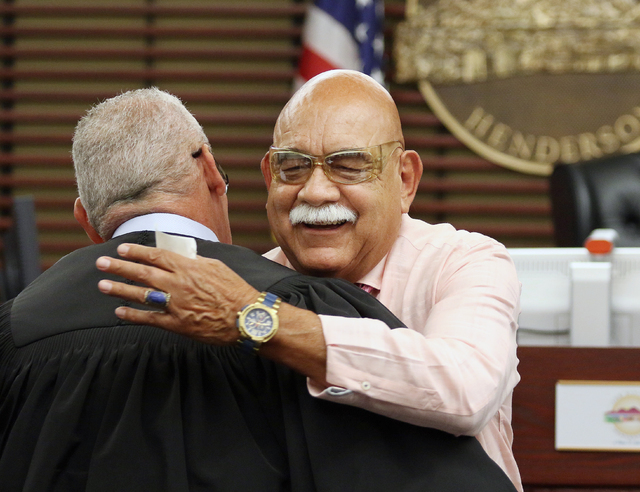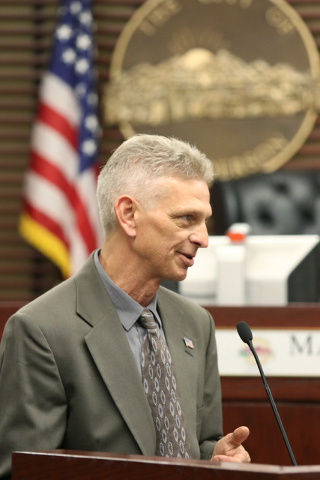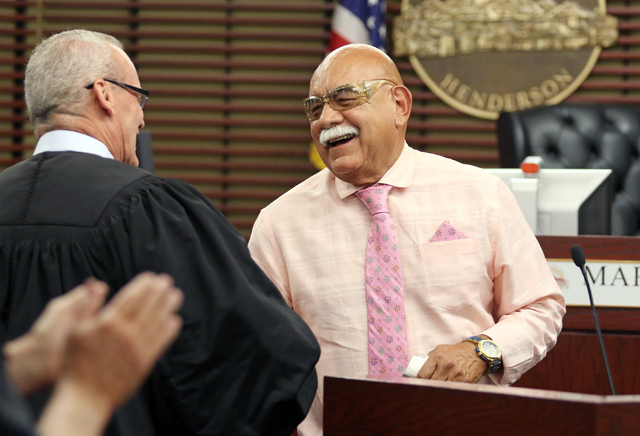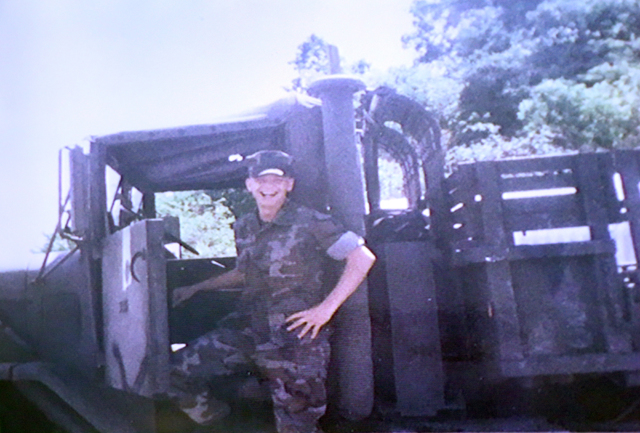Henderson Veterans Court offers second chance to struggling former military members




Albert Gutierrez was too old to continue down the path he was on, which included sleepless nights locked up in jail. Years of alcohol abuse had left the 70-year-old U.S. Army veteran in trouble with the law and estranged from his family.
When the treatment court known as Veterans Court was made an option to him, he had a choice.
“Some of the younger people (who could go through Veterans Court) said they would rather go to jail 30 days and be done instead going through the program,” Gutierrez said. “I decided I’d rather do the program. This program saves lives.”
About eight years ago, a law was created to establish veterans courts in Nevada. Henderson Judge Mark Stevens, who is also a veteran, brought that into reality at the Henderson Municipal Court about five years ago.
The program treats underlying problems by helping participants who have had run-ins with the law get into court-ordered counseling, find treatment for post-traumatic stress disorder or receive any drug or alcohol addiction counseling if they need it. In some cases, defendants also have to go through treatment for domestic violence.
Participants can spend one to two years in the program depending on their needs and progress.
But if anyone can power through the obstacles of a treatment court, Stevens believes it’s a soldier.
“The times you wanted to give up here are just like the times you wanted to give up in boot camp,” he said.
During that time, veterans go through random drug and alcohol testing, check in regularly with the judge and attend a range of meetings every week. There have been nearly 100 graduates.
On June 16, another five veterans stood before their families, Judge Stevens and a handful of former graduates to celebrate the completion of the program. Each graduate took time to talk about his story about life before and after the court.
“I was always angry,” said Gutierrez, a Vietnam veteran. “Every morning I woke up, and I was so angry I could punch a nun.”
To manage his anger, he found booze and drugs. It seemed to work well for him for a long time.
But nearing 70, he realized it was too much to spend the night in jail for drunken driving. That’s when he discovered the program and decided it offered a better path.
“I thought I wouldn’t finish,” he said. “It was too demanding, but I stuck with it.”
Similar to Gutierrez, Bill Zirkel’s life was in chaos before entering Veterans Court.
“I had no direction,” he said. “This helped me turn things around.”
Even when things got complicated in the program, he pushed through the obstacles.
“If it’s not tough, it’s not worth it,” he said. “This program is a lot of work, but it’s worth it.”
In the back of the courtroom, Zirkel’s arresting officer watched as the men spoke. Zirkel asked him to stand.
“I just want to say thank you,” Zirkel said to the officer. “You’re the reason I started thinking about making better choices.”
Gutierrez officially wrapped up the program in May but came back nearly a month later to join the other graduates. “This day means a lot to me,” he said.
The courtroom was also overflowing with mentors — some graduates of the program themselves — who have been instrumental in helping the participants succeed.
Mike Blanchard, Gutierrez’s mentor, has been mentoring veterans in the program for three years.
“It is the greatest feeling to see them complete the program,” he said. “When they start, a lot of them are negative and don’t think they will finish.”
As the days go by, Blanchard watches as the veterans reconnect with family members, kick habits and turn their lives around.
Along with acknowledgments from Stevens, the men also heard from Lt. Gen. Emil R. Bedard.
“You challenged yourself and did more than you thought you could,” Bedard said. “This program was a climb.”
Though he is finished as a participant, Gutierrez plans to return and be a mentor to another class of veterans. In order to be a mentor, former participants must wait a year after they finish the program.
He adds it’s the least he can do.
“This program gave me my daughter back,” Gutierrez said. “This program gave me my life back.”
To reach Henderson View reporter Michael Lyle, email mlyle@viewnews.com or call 702-387-5201. Find him on Twitter: @mjlyle.












